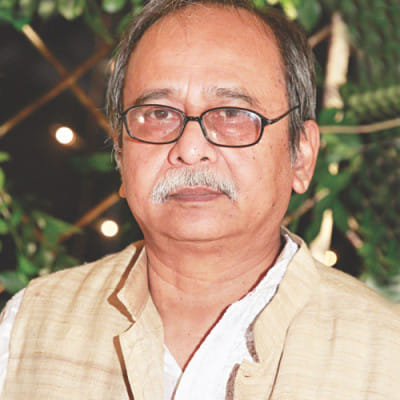"History belongs to the masses"

How important do you think the role of history is in our society?
The way I see it, I think history, not only in the context of Bangladesh, is like a mother, on which everyone has a right. Take you or your friends for example. You have a claim on history, but you may not own Physics to that extent. From that perspective, history belongs to the masses. This can explain why every new university starts with a History department and a department of its own mother tongue. The core subjects that Dhaka University started with were Physics, Chemistry, History, English and Bangla. In Amartya Sen's Nalanda University, History is one of the first subjects that were introduced.
It is crucial to read history because it gives us an understanding of the society. Some have this misconception that history is the tale of Kings and Queens, which is no longer so. It is now treated as the evolution of human society and its relationships.
However, there was a time when, with the development of market economy, the universities in the West set their focus primarily on subjects that the market demanded. After that they have realised that without humanities at the tertiary level, it is not possible to create a humane society. This is why whatever you study at the university, you will have to have a humanities subject in your curriculum.
Dr. Harun, VC of National University (NU), decided to make National History a compulsory subject for all the students of NU. We will surely see the effect of this in three to four years, when we will see three to four million students who have studied history at the university level. A course on National History, I believe, should be made compulsory at all public and private universities. Otherwise, the risk runs high that we will turn into a nation without any root, which will hinder our progress.
There are some major pre-1971 milestones in our history such as: 1952, 1966, 1969 and 1970-1971. No history of this land can be written without extensively covering them.
If we go back a little further than that, the Bengal Renaissance…
The awakening in Kolkata that some books talked about happened in that part of Bengal. We can call it awakening, reawakening, renaissance - there is a debate on what it should be called. But as the East Bengal was a hinterland, its history was never written. We are, in fact, the first to bring it out. I have shown in my thesis that 1870 is the year of our awakening. There are a lot of indicators - printing press, development of municipalities, publication of books and newspapers, spread of education, the advent of Brahmoism, jute cultivation and the economic growth associated with it.
What do you think is the role of the individual in history?
It is important in history to take into consideration what the masses want. A particular event in time drives an individual to a certain role, and he who understands it becomes the hero. We had been talking about exploitation since as far away as 1947. I have seen in the archives that the Chairman of Noakhali municipality had said that if this kind of exploitation continued in that year, we would not have any other way but to seek independence. But Bangabandhu emerged in 1966 by going in total opposition of his party leadership. He created the famous 6-point demand to articulate the aspirations of the people and became the leader.
Turning to a different topic, did Muntasir Mamun as a child have any idea that he would write 300 books?
All my family members were involved in teaching. Some of them are also writers. My father's thesis on the Chittagong Port had 16 volumes. He first wrote on management in Bengali. Borhanuddin Khan Jahangir is a major Bengali writer while Mohiuddin Khan Alamgir has written books on economics. My son has also written books. I believe that one's surrounding makes her/him what s/he later becomes. I am fortunate enough to come across people like Satyen Sen, Ahsan Habib, Ranesh Dasgupta, which had happened because of my uncle, Borhanuddin Khan Jahangir, who also taught me to read. My parents had allowed me to be what I am now. I got a Presidential prize in 1963. I wrote my first book, which was for children, in 1968-1969 and it was published under the supervision of Satyen Sen and Ahmed Sofa.
I was not a meritorious student. I remember asking Professor Abdur Razzak if I should continue teaching as I got a Second Class. I got the job because some of my teachers had laid down their lives in the war. Professor Razzak replied, "Hard work is 95 percent and talent is 5 percent. If you are ready to work hard, no one will be able to stop you."
When I had taken up a post at the university, I had promised myself that every year a book of mine would be published. If I can't find anything to write, I will, at the very least, translate. If I cannot do even that, I will edit a book. That was in 1974. So far, every year I have penned a book in a year at the least. I have kept my promise. I think I serve people through my writing. I constantly feel the urge to write. I also think that one has to oraganise to implement the theoretical basis of what one is writing. I am involved in five to six museums as well.
Is writing routine work for you? When do you usually write?
Some of us have this idea that to be writer you need to be a little bohemian. History, however, suggests otherwise. You need to lead a disciplined line and maintain a healthy life to be a good writer. Take a singer: s/he has to practice every day. The same goes for the writer: s/he has to write every day. I go to my home at the university in the morning to write and spend the day there. From three in the afternoon to five in the evening, I allot my time for students and well-wishers. After getting back home, whenever I get the opportunity, I sit at the table to write.
Is it at all important for a scholar/intellectual to be involved in activism?
Without politics, it is impossible to be a creative intellectual. He won't have any difference with potatoes and pointed gourds. In our country, every intellectual carries a baggage. S/he has to struggle for an array of issues. That's why you will see that all the political struggles in our country are spearheaded by this type of people. Politicians came later to take it to the masses. Even during the last military rule, at least 10 teachers rose to the occasion and led a movement. A poet like Shamsur Rahman had to head the Nirmul Committee. This is a part of life for us.

 For all latest news, follow The Daily Star's Google News channel.
For all latest news, follow The Daily Star's Google News channel. 




Comments